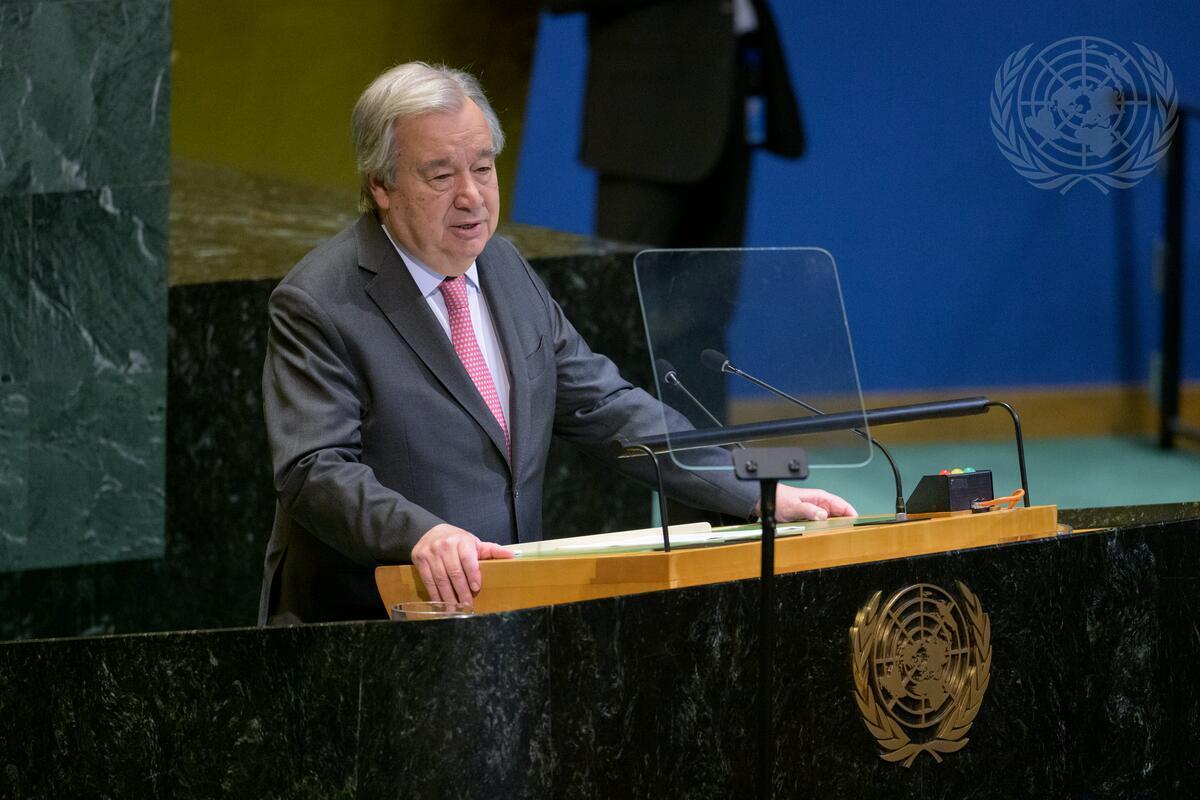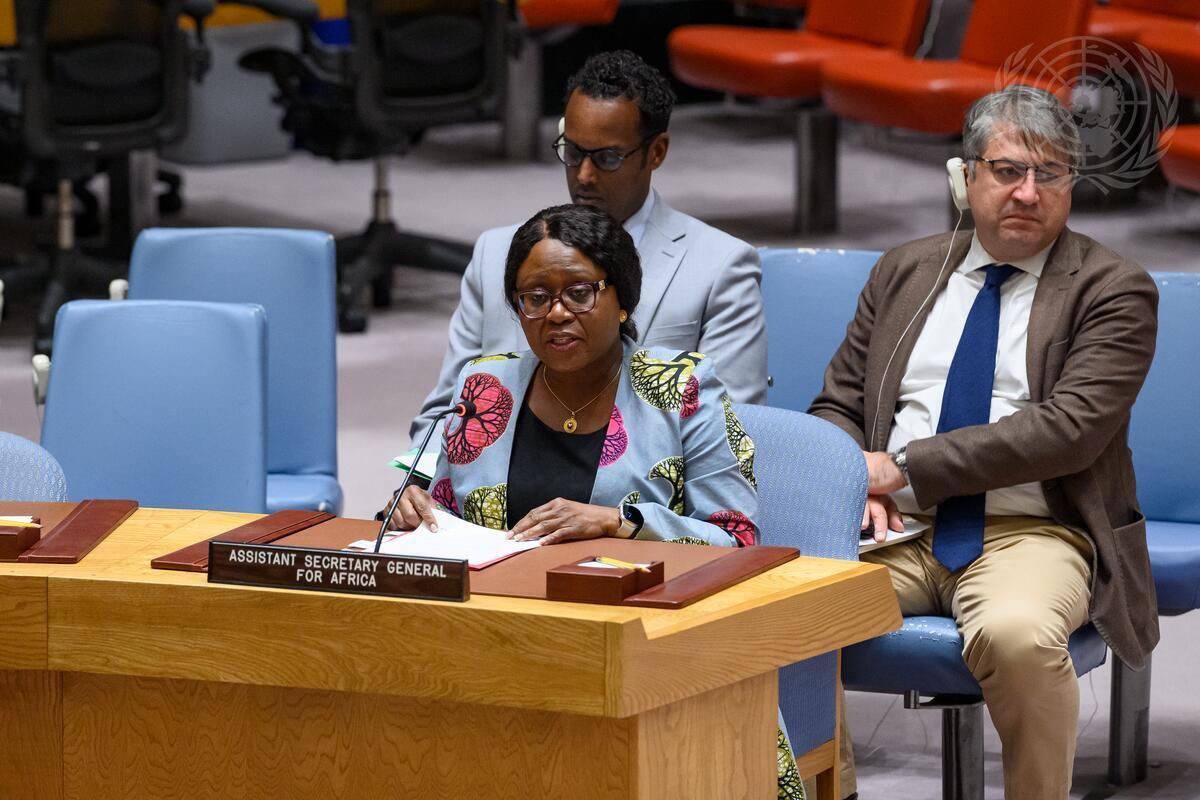Madame President,
Members of the Security Council,
More than five weeks have passed since the eruption of fighting between the Sudanese Armed Forces and the Rapid Support Forces in Sudan on 15 April. Despite repeated earlier declarations of ceasefires by both sides there has been no day without fighting and neither side has been able to claim a military victory.
The Jeddah agreement is s an important step forward. It offers hope for civilians and it shows that the violence can be ended if both sides comply. I will return to this at the end of my short presentation.
Sudan’s civilian population has already paid a heavy price for this senseless violence.
According to the estimates of the Doctors’ Union, more than 860 civilians have been killed, including more than 190 children, with another 3,500 civilians injured. Many are missing. Over a million have been displaced: more than 840,000 have sought shelter in safer parts of the country while another 250,000 or so have crossed Sudanese borders.
These figures do not capture the harrowing stories of thousands of men and women, who abandoned their homes in search of safety across the borders. Many have waited days and weeks at border crossings, to secure passage.
Neither do these figures illustrate the suffering of many others who could not leave and stay in their homes with depleted supplies and no access to humanitarian assistance.
I am grateful to those countries who are receiving refugees and returnees fleeing Sudan. It is vital that borders remain open to those who seek safety. Procedures at border crossings should be expedited. The United Nations continues to avail our support to alleviate the burden on neighbouring states and ensure that refugee needs are met with dignity.
Madame President,
In Khartoum, Darfur and elsewhere, the warring parties have fought their war with little regard for the laws and norms of war. Homes, shops, places of worship, water and electricity installations have been destroyed or damaged.
The health sector is collapsing with more than two-thirds of hospitals closed, many health care workers killed and medical supplies running low. The frequently reported use of health facilities as military positions is unacceptable.
I am appalled by the reports of sexual violence against women and girls, including allegations of rape in Khartoum and Darfur. The United Nations is following up to verify these cases. The warring parties must prevent any reoccurrence of such violence.
Children are facing serious protection concerns and continue to be vulnerable to recruitment sexual violence, and abduction.
Reports of rampant looting, of intimidation, harassment, and enforced disappearance are deeply concerning. UN premises and residences, including the UNITAMS compound, as well as large amounts of food and humanitarian supplies have also been looted.
Criminality is compounded by the release of thousands of prisoners and the increasing spread of small arms.
I am also concerned about reported death threats against political activists and leaders, about the arrests of Sudanese volunteers, and the intimidation of journalists.
Excellencies,
In parts of the country, fighting between the two Armies or the two armed formations has sharpened intercommunal tensions or triggered conflict between communities. In El Geneina in West Darfur clashes between the Sudanese Armed Forces and the Rapid Support Forces spiraled into ethnic violence on 24 April. Tribal militias joined the fight and civilians took up arms to defend themselves. Homes, markets, hospitals were ransacked and burned. UN premises looted. In mid-May, renewed violence reportedly led to more death and destruction. Altogether more than 280 persons were reportedly killed and tens of thousands were displaced to neighboring Chad. The security situation is impeding the delivery of humanitarian aid. I continue to engage national and local leaders to de-escalate the situation.
Worrying signs of tribal mobilization are also reported in other parts of the country particularly in South Kordofan as well as the Blue Nile region.
The fighting throughout the country has resulted in serious human rights abuses and violations of international humanitarian law and undermined the protection of civilians. These violations must be investigated, and the perpetrators must be brought to justice. The United Nations family continues to monitor and advocate for an end to all these violations.
Members of the Council.
Some commentors have placed the blame for this conflict on the international community for not having seen warning signs. Others blame the political process, or the Framework Agreement, which intended to lead to a civilian-led government. Or blame the international community for giving an outsized role in the process to the men with guns.
But let us be clear: the responsibility for the fighting rests with those who are waging it daily: the leadership of the two sides who have chosen to settle their unresolved conflict on the battlefield rather than at the table. It is their decision that is ravaging Sudan. And they can end it.
What has been happening on and since April 15 is precisely what the United Nations and our partners in the international community tried to prevent. Before and after 25 October, the military takeover of 2021, we engaged diligently with the two military and civilian leaders to persuade them to talk and to return to a meaningful transition to civilian rule through a political process.
As the tensions grew amidst reports of a buildup of forces, I raised the alarm in my briefing to this Council here in March and I urged the parties to de-escalate.
In the two weeks prior to the outbreak of fighting, I, alongside with my partners in the Trilateral Mechanism and the Quad, intensified our engagement with the military leaders to de-escalate the situation. We coordinated these efforts with Sudanese civilians who also tried to mediate between the Generals, recognizing the gravity of the situation. And we asked regional actors to use their leverage with the two parties.
Our efforts continued until the night before April 15, when we thought progress had been made. Only to wake up the next morning to the reality that the parties had chosen war.
Madame President,
Unfortunately, the hostilities compelled us to temporarily relocate many of our staff to Port Sudan and outside Sudan. Let me be very clear here: this does not mean that we have abandoned the Sudanese people or the Sudan. We continue to work with our Sudanese partners.
And, we remain firmly committed to four immediate priorities: (1) achieving a stable ceasefire with a monitoring mechanism; (2) preventing the escalation or ethnicization of the conflict; (3) protection of civilians and provision of humanitarian relief; and (4) preparing, for when the time is ripe, a fresh political process with the participation of a broad array of civil and political actors, including women.
Through our hub in Port Sudan, UNITAMS has supported the efforts of our Country Team and humanitarian partners to restore the flow of humanitarian supplies into and within the country. The United Nations family is doing our utmost to expand our response throughout the country, particularly in areas of acute need. But it is also essential that the East of the country – that is Red Sea State where Port Sudan is, and Kassala and Gedarif – is not only used as an entry point for humanitarian aid but receive a fair share of it. Not least with regard to the increasing movement of displaced people to this region.
Additional funding is urgently needed. The revised Humanitarian Response Plan was launched on 17 May, requesting 2.6 billion dollars to reach 18 million people in need, up from 15 million before the fighting began.
Madame President, Excellencies,
Thanks to Saudi and US mediation, representatives of the Sudanese Armed Forces and the Rapid Support Forces signed a Declaration of Commitments in Jeddah on 11 May and an agreement on a short-term ceasefire and humanitarian arrangements on 20 May. The agreement is supposed to enter into force tonight, it shall remain in effect for 7 days, it is renewable, and it should allow civilians to move and for humanitarian access to get to the people. This is a welcome development, although the fighting and troop movements have continued even today despite a commitment of both sides not to pursue a military advantage before the ceasefire takes effect. We understand that a basic monitoring mechanism will be set up between the two parties and the mediators. UNITAMS stands ready to support a monitoring mechanism for the longer term or for a permanent ceasefire. We can build on the staff and on the structure established in the Permanent Ceasefire Committee for Darfur which UNITAMS has been chairing since mid-2021.
I continue to urge the parties to honor this agreement which they signed two days ago. They must stop the fighting, they must allow access for humanitarian relief, protect humanitarian workers and assets, and allow safe passage for civilians to leave areas of hostilities.
I will also continue to engage the leadership of the Sudanese Armed Forces and the Rapid Support Forces, to ensure the protection of civilians and civilian infrastructure while pushing for an end to this war.
We are coordinating closely with Sudanese partners working for peace. Let me also commend the leaders of the armed movements signatories to the Juba Peace Agreement for their efforts to restore peace and for their neutrality in this conflict.
Sudanese civil society is playing a strong role in advocating for peace, while continuing to support civilians in need. Their efforts must be supported.
Both parties have been calling on me to condemn the respective other side’s actions. I call on both to end the fighting and to return to dialogue, in the interest of Sudan and its people.
Lives and infrastructure have been destroyed. The growing ethnicization of the conflict risks to expand and prolong it, with implications for the region.
The agreed short-term ceasefire could and should also pave the way for talks for a durable cessation of hostilities.
And, as the talks advance, a diverse array of civil and political stakeholders must play their role. Ultimately, only a credible civilian-led transition can chart lasting peace in Sudan.
I note the appointment of Malik Agar, a signatory of the Juba Peace Agreement and Chair of the recently formed peace bloc, as Vice President of the transitional Sovereignty Council. Agar stated that his overall priority is to reach a permanent ceasefire, to end the war and to silence the guns. This certainly deserves our and your full support.
Regional and international efforts to end the fighting in Sudan are laudable. As these efforts multiply, we must ensure coordination to forge a common approach. That will enhance our collective leverage and the effectiveness of our efforts. Any coordinated plan must involve Sudan’s neighbors and the region. I am very glad my colleagues Commissioner Bankole and Executive Secretary Dr. Workneh will speak and be able to go into more details regarding the efforts of the trilateral partners, the UN, African Union and IGAD.
The United Nations will continue to work closely with our partners in this Trilateral Mechanism, the African Union and IGAD, in support of these efforts and in coordination with others.
Thank you.






